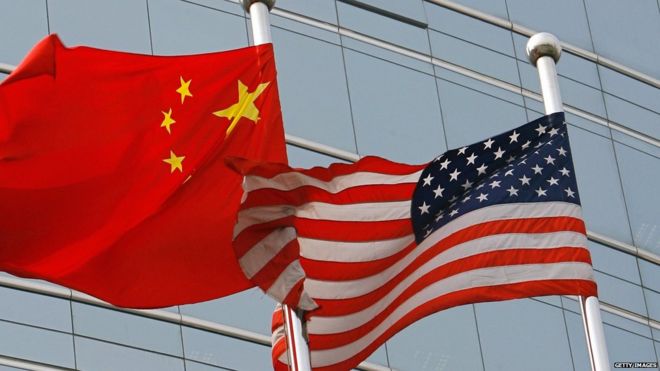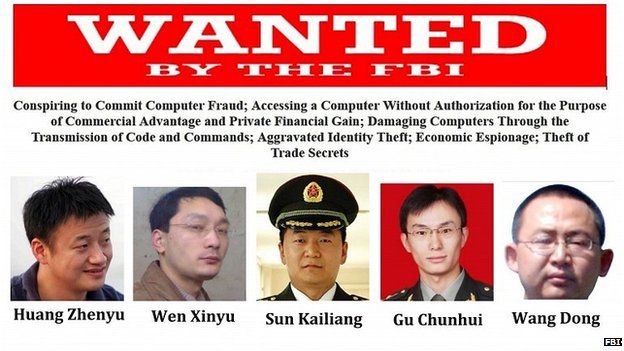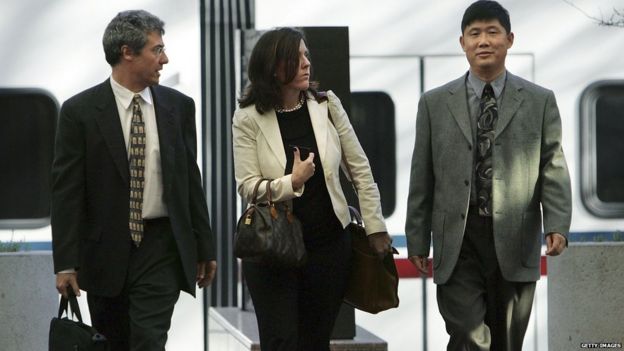How vulnerable is the US/Canada to threat of Chinese spies?
- 20 May 2015
 GETTY IMAGES
GETTY IMAGES
A new case shines a spotlight on Chinese espionage in the US. Some see the problem as dark and terrifying. Others say it's just business as usual.
Hao Zhang, a 36-year-old professor at Tianjin University, arrived in Los Angeles on Saturday. He was arrested at the airport and charged with economic espionage and theft of trade secrets.
The arrest of Mr Zhang and several other Chinese citizens this week was celebrated in some quarters.
"Bravo, FBI," said a former senior intelligence official. He described it as an "efficient case", saying it shows US officials are attempting to stop Chinese efforts at espionage.
 GETTY IMAGES
GETTY IMAGES
Still, he said, it's only one case, "a small piece of the total picture of economic espionage and the outward flow of intellectual property".
Others have a grudging admiration for Chinese spies. "They're very thorough," said Gordon Adams, a former senior White House official for national security budgets.
Yet, he said, it's not that big a deal. "The reality is that nations are always spying on each other," he said. 'It's consistent."
Years ago agents working for the Chinese government seem to have obtained classified information about America's Trident warhead, as David Wise wrote in his book Tiger Trap.
Chinese scientists may have used this information in their efforts build a small nuclear warhead.
 GETTY IMAGES
GETTY IMAGES
When it comes to cyber-espionage, the government of China is a "major perpetrator", Wayne Morrison wrote in a March report about China-US trade issues that was prepared for members of the US Congress.
In 2011 Rep Mike Rogers, as chairman of the US House Permanent Select Committee on Intelligence, described a "massive campaign being conducted by the Chinese government".
China is behind most of the theft of US intellectual property, the Center for Strategic and International Studies' James Andrew Lewis wrote in the Washington Post. The thefts costs the US about "$100bn a year" (£64bn).
Still, Mr Lewis said, Americans should keep some perspective. He described the loss "as a rounding error in our $15tn economy".
Hao Zhang and Wei Pang both studied electrical engineering at University of Southern California. They worked together on research funded by one of the US government's most secretive organisations, Darpa (Defense Advanced Research Projects Agency).
 FBI
FBI
Afterward they became professors at Tianjin University. Then, federal prosecutors said, they turned into spies.
Mr Pang, 35, and Mr Zhang, stole trade secrets from two US companies, Avago Technology and Skyworks Solutions, where they had each been employed, according to court filings.
The technology was valuable - and sensitive. Some of it was designed to improve the reception of mobile phones, and it can be used for military communications.
Other defendants, all charged with conspiracy to commit economic espionage, are Jinping Chen, 41; Chong Zhou, 26; Huisui Zhang, 34; and Zhao Gang, 39.
Meanwhile another case of Chinese espionage may be a warning of how these investigations can sometimes founder.
Sherry Chen, who's originally from China, worked at the National Weather Service in Wilmington, Ohio, until she was accused of espionage. Authorities said she'd obtained information about US water systems - and lied about her contacts with Chinese authorities.
She recalled what it was like when she was arrested at her office. "Suddenly the door opened," she said on BBC's Newshour.
 GETTY IMAGES
GETTY IMAGES
"There were six FBI agents," Ms Chen said. "They showed me the handcuffs. I requested the FBI agent to read the indictment on the spot. But I still didn't have an idea of what they were talking about."
Ms Chen was told she could be sentenced to 25 years in prison. The charges were eventually dropped, however, and she's tried to resume her life.
This week details about the case of Mr Zhang are still being revealed. It's a case that will be watched closely - both by those who believe the threat from China is growing and by those who think it's exaggerated.
No comments:
Post a Comment
Comments always welcome!